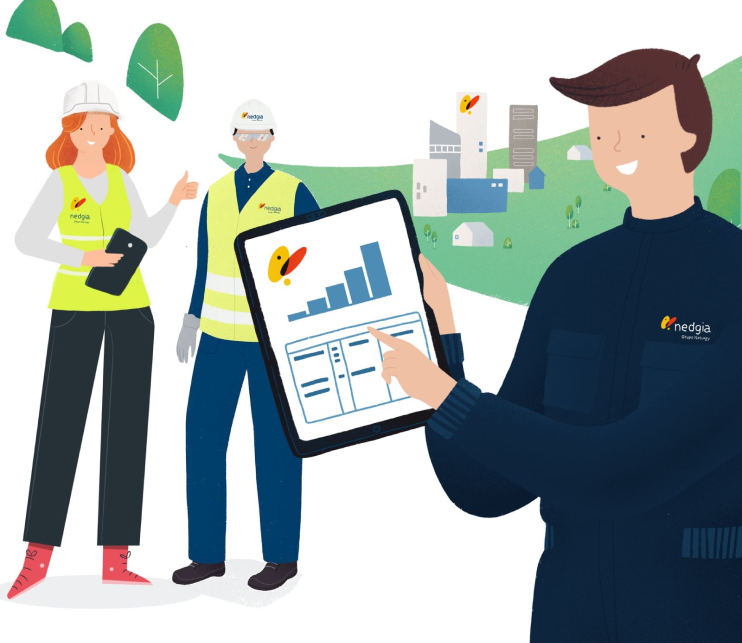The facility in Noez (Toledo) will have the capacity to manage 100,000 tonnes of waste a year for the production of biomethane and organic fertiliser products.
The plant will inject a quantity of gas equivalent to the consumption of 6,500 households, and will prevent 7,280 tonnes of CO2 from being released into the atmosphere per year.
- The agreement allows Castile-La Mancha to make significant progress in reducing greenhouse gas emissions, renewable energy penetration and the circular economy, turning agricultural and livestock waste into a valuable energy resource.
Biomethane Initiatives, a joint venture created a year ago by Suma Capital, a sustainable infrastructure investment management company, and Sitra, a water treatment and waste management company based in Castellon, has reached an agreement with Naturgy group to inject 40GWh/year of biomethane into its gas network.
The facility, located in the municipal district of Noez (Toledo), has an area of 12.4 hectares, of which four are dedicated to biomethane production. This is the first Biomethane Initiatives renewable gas plant and it is expected to generate 40 GWh of biomethane per year, equivalent to the annual energy consumption of 6,500 households. It will also generate 30,000 tonnes of solid fertiliser, preventing the release of 7,280 tonnes of CO2.
The project has an investment of 15 million euros and commissioning is scheduled for summer 2024. Nedgia will install a purpose-built 700-metre gas pipeline from the point of production to the gas distribution network. The company has an infrastructure network of over 57,000 kilometres throughout the country, essentially to develop biomethane.
Montes de Toledo Biomethane plant: local energy
The aim of constructing and operating this facility is to recover energy from various agricultural and livestock by-products, from cow manure and pig slurry to sewage sludge and waste from nearby agri-food industries. It will also be capable of managing 100,000 tonnes/year of by-products and waste to produce biomethane and fertiliser products.
Each year, the plant will process waste from nearby facilities, producing zero-kilometre renewable gas. Specifically, 50,000 tonnes of manure from cattle fattening farms; 30,000 tonnes of pig slurry from pig farms; and 20,000 tonnes of sewage sludge and agri-food waste.
Biomethane production: a great opportunity for Castile-La Mancha
Castile-La Mancha is the third autonomous region in terms of biomethane production potential, with 13% of Spain’s total, which is enough to decarbonise 100% of the region’s current natural gas consumption. According to a recent report by PWC, the development of full biomethane potential in the autonomous region would require the construction of 305 plants and a total investment of €5.5 billion in plants and networks, which would contribute significantly to local job creation.
The plant is the first step in this direction, creating 60 direct and indirect jobs.
“With Biomethane Initiatives we continue to move forward in our goal of joining forces with companies that share our vision such as Nedgia, laying the foundations for a more circular and sustainable economy through new infrastructures. We believe that this platform is a leader and unique in biomethane production assets”, explains Sergio Fernández, Partner at Suma Capital.
Ricardo Sáez, Managing Director of SITRA, stated that “the Montes de Toledo Biomethane plant will not only contribute to decarbonising our current natural gas consumption, but it will also create local jobs”. Mr Sáez also added: “It is a project in which Biovic has also taken part as head of engineering, that deepens our commitment to creating sustainable, energy-efficient solutions for a more resilient and environmentally friendly society.”
Raúl Suárez, CEO of Nedgia, points out that “renewable gas and the networks that transport it are crucial for the energy transition, and they represent a great opportunity for Castile-La Mancha. This project reaffirms Nedgia’s commitment to the region, consolidating our firm dedication to biomethane as a sustainable, safe and competitive energy source.”
About Suma Capital
Suma Capital is an independent alternative asset management company, leader in the energy transition and climate action. The company focuses its investments on sustainability with three different programmes: Sustainable Infrastructure, Growth Capital and Venture Capital. Suma Capital was founded in 2007 and is nowadays a European player managing over 800 million euros, present in Barcelona, Madrid and Paris. The Sustainable Infrastructure division is a pioneering initiative that has been supporting companies and projects that foster the energy transition and the circular economy for the last 10 years, with the aim of obtaining both financial and socio-environmental benefits.
About SITRA
SITRA offers comprehensive and innovative solutions for efficient and sustainable water management in industry, renewable gas generation and biofertiliser production. Its range of environmental engineering solutions includes implementing biomethanisation plants.
It has a strong commitment to innovative and research activity to provide solutions geared towards generating a greater positive environmental impact and gaining a more competitive position for its projects.
About Nedgia
Nedgia, the Naturgy group subsidiary is the leading company for natural gas distribution in Spain, where it operates in 11 autonomous regions and 1,150 municipalities. It has over 5.4 million supply points, representing 70% of consumers. Its main assets are its 57,000 kilometres of networks that enable safe and efficient supply of natural gas and renewable gas (biomethane), as well as hydrogen going forward. Innovation, proximity and customer service are part of its raison d’être, and define its activity. Nedgia remains firmly committed to renewable gases and their incorporation in gas system infrastructure. The company has five biomethane plants in operation, injecting into its infrastructure network, and an additional portfolio of around 200 projects in different stages of development that will enable it to incorporate new production of this renewable gas in the short and medium terms in Spain, the country with the third greatest potential for biomethane production in Europe.







